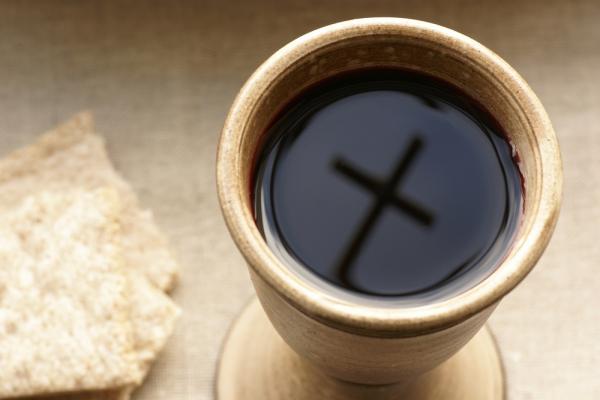Anyone who thinks much on theology will tell you that you go through patterns of thought. For a long time, I was intrigued — and still am in many ways — by the notion of Jesus as a “third way” prophet, offering something different than both church and secular culture most of the time. As I learned of different interpretations of the crucifixion, I became obsessed with nonviolent activism, and the idea of responding to force or bloodshed with something else entirely.
Now, my latest mental track is sacrament. I am interested in what makes something a sacrament, yes, but also in the power connected to sacraments and what human beings do with that power.
I am part of the Christian Church (Disciples of Christ), a denomination that has Alexander Campbell as part of its roots. Campell was notorious for supposedly causing a stir in his local church around the sacrament of communion. At that time, the Church handed out tokens to those it deemed worthy to participate in communion. No token? No communion. So this one particular day, Campbell entered the church with his token in hand, but when they offered the elements to him, he refused, tossing the token on the ground and walking out. He went on to help start the Disciples based, in large part, on the concept of the open communion table.
Martin Luther was no stranger to such kinds of rebellion either. Much of his issue with the Catholic Church, which led him to nail his “Ninety-five theses” to the famous Wittenburg Door, focused on the church using certain sacred rituals and elements as a means to wield power over its faithful.
While I admire, and am grateful for, such courageous people and acts, it occurs to me that we don’t really need them. Their confrontation of the religious powers that be only come to being in an environment where we collectively afford someone else the power to mediate the ways in which we have access to God and God’s grace.
But the fact is that, if it has to be mediated, it’s not really grace any more. It’s a favor.
To me, the most beautiful thing about sacraments like baptism and communion are that they are, at the same time, richly communal and deeply personal. By participating in these acts together, we bear witness to, and mark, one another’s lives. Our joys are multiplied, and our sorrows and suffering, shared and made a little lighter. This is why we have funeral services. After all, it’s not like it’s for the person in the casket; they’re already gone.
Collective sacramental acts also are part of a greater covenant — a holy promise, as my wife, Rev. Amy Piatt emphasizes every week at our church in Portland — that binds us together, holding one another up, and holding each other accountable. It’s not unlike having a workout partner to help keep you motivated, but also to make sure you don’t get stuck under a huge barbell and can’t get out.
Having said that, the practice of taking part in sacrament, when seen as necessarily symbolic, while not having any particular supernatural power in and of itself, is a profoundly personal experience. It is between you and God. And really, for those kinds of experiences to grab hold of you, the elements and communal context, though helpful, aren’t essential.
It’s like when I asked my mom, who is a Southern Baptist, what she though of my fiancé at the time (now wife) living together. Her answer surprised me. “In my view,” she said, “you were bound together by the Holy Spirit once you decided to get married. The wedding is really more of a formality.
I think she’s right. Sacraments are outward expressions of acts, longings, or processes already underway or taking place within us. Yes, they long for expression, which is why we participate in the act. But remembering that the power is not in the acts or elements themselves, but rather in the faith of the individual and the grace of God alone, is truly, radically subversive.
It’s the kind of faith that shakes empires, while also helping to hasten God’s re-imagined kingdom among us. It puts religion in its proper place as a steward or guide in our faith walk, but not as gatekeeper, mediator, or arbiter. It rattles the columns of existing power structures and takes ownership of one’s own relationship with God.
So the next time you take communion, light a candle in prayer, or witness a baptism, listen carefully. If you pay attention, you can hear the powers that seek to control, own, or consume crumbling, revealing the face of God beyond the dust and ashes.
Christian Piatt is a Sojourners Featured Writer and an author, editor, speaker, musician, and spoken word artist. He is director of church growth and development at First Christian Church in Portland, Ore. Christian is the creator and editor of Banned Questions About The Bibleand Banned Questions About Jesus. His new memoir on faith, family and parenting is called PREGMANCY: A Dad, a Little Dude and a Due Date.
Photo: Magdalena Kucova/Shutterstock.com
Got something to say about what you're reading? We value your feedback!
